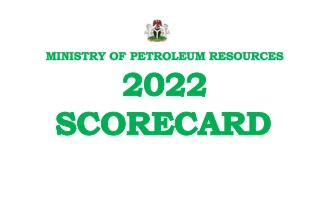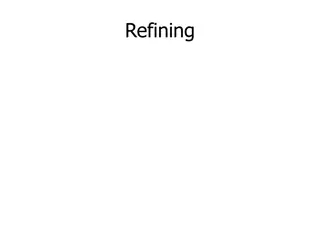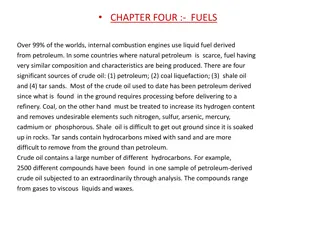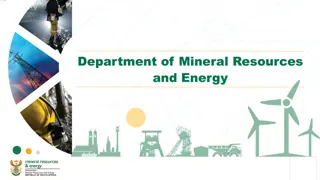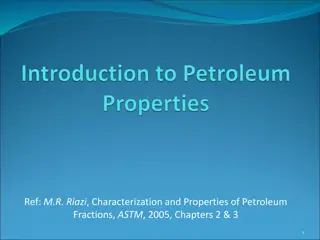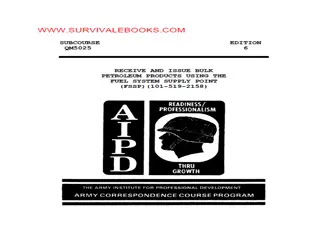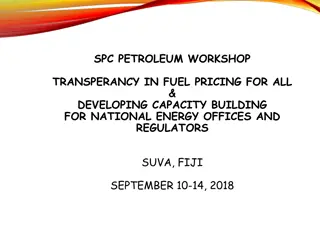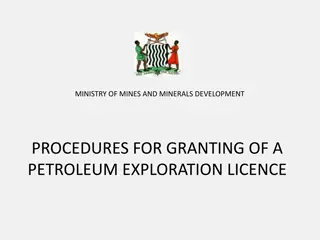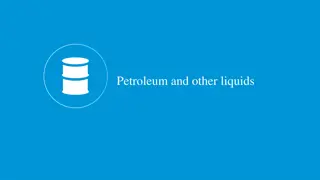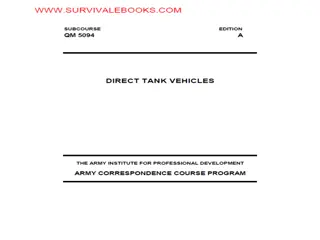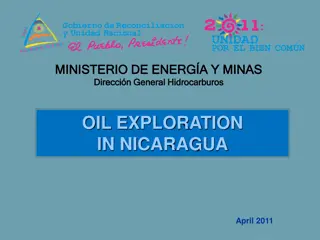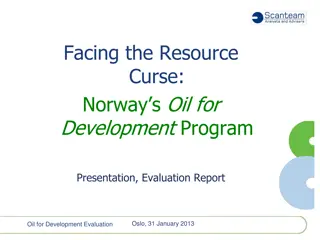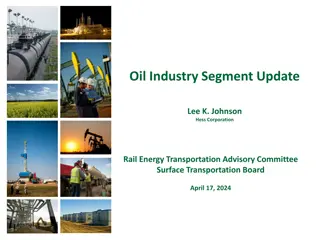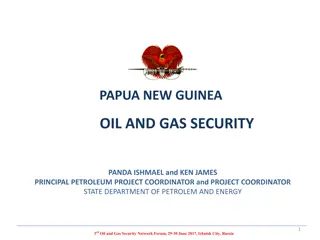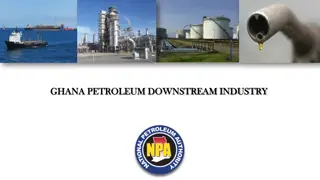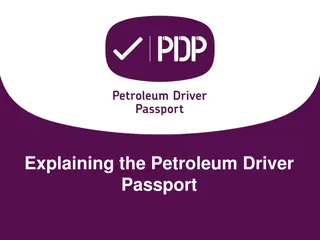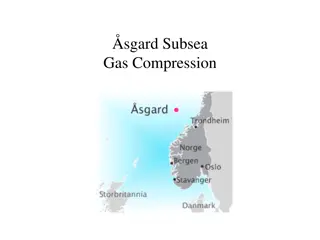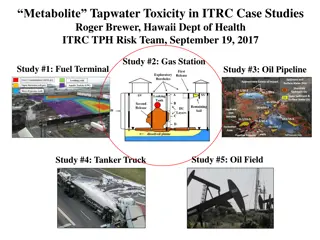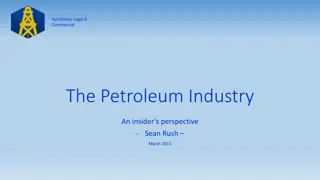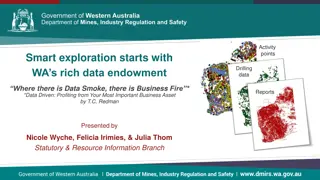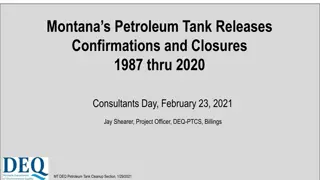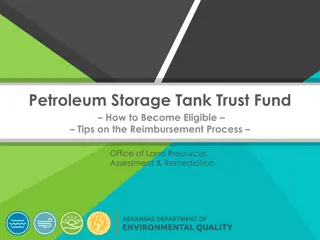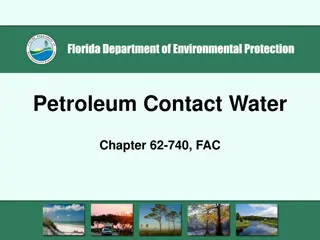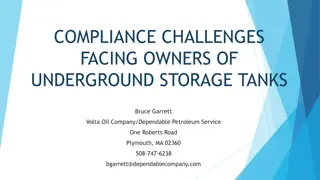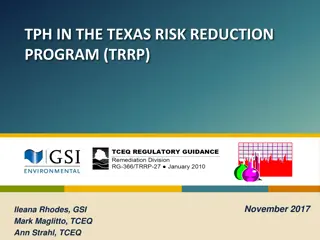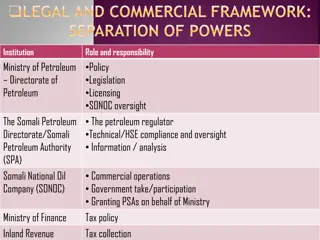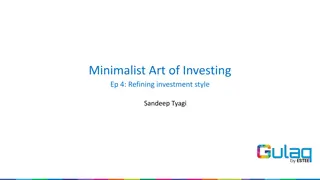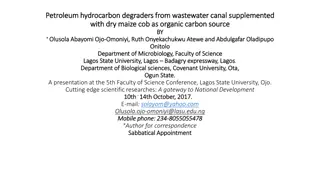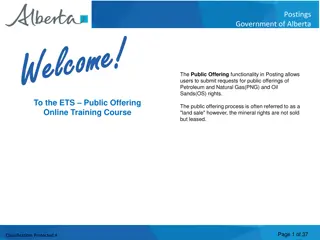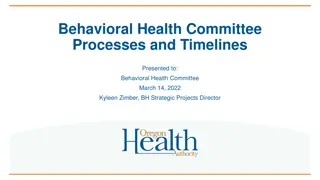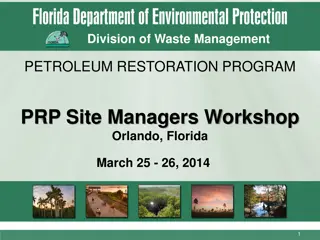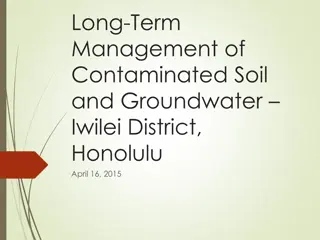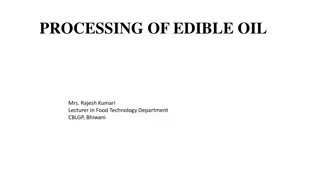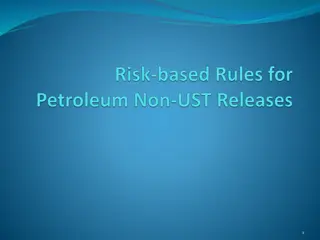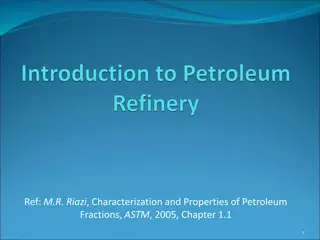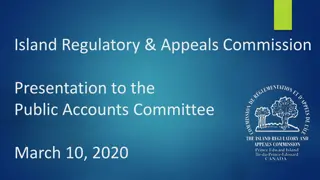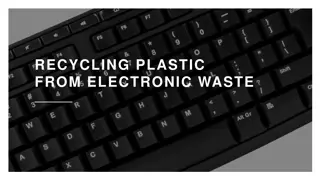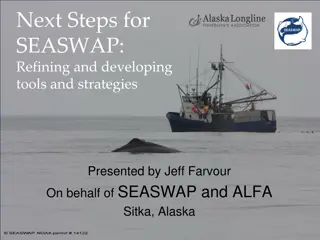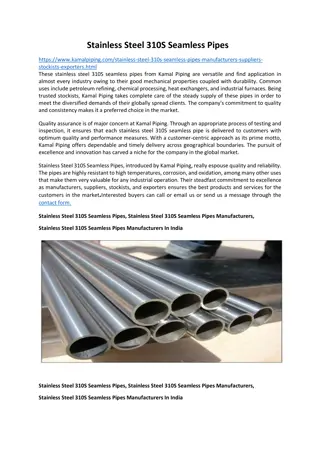Strategic Roadmap for Nigeria's Petroleum Industry: 2019-2023
This document outlines the key strategic priorities set by the Ministry of Petroleum Resources in Nigeria for the period 2019-2023. It covers objectives such as eradicating fuel smuggling, increasing crude oil production, reducing extraction costs, promoting legislative reforms, enhancing refining c
2 views • 32 slides
Journey of Refining Sugar: From Raw Material to By-Products
Explore the detailed process of refining sugar from raw material to final product, including heating, mixing with lime, CO2 saturation, charcoal filtration, and crystal drying. Learn about the utilization of by-products like bagasse and press mud in fuel production, paper manufacturing, and as natur
0 views • 57 slides
Understanding Fuels and Their Sources
Fuels derived from petroleum, coal, shale oil, and tar sands are crucial for powering internal combustion engines. Crude oil contains various hydrocarbons requiring refining processes to obtain products like natural gas, gasoline, kerosene, diesel oils, fuel oils, and lubricating oils. The chemical
1 views • 7 slides
Petroleum Refining Industry in South Africa: Current Overview
South Africa's economy heavily relies on petroleum, with an installed refining capacity of 520,000 barrels per day and additional Coal-to-Liquid and Gas-to-Liquid refineries. Despite challenges like operational disruptions, the sector plays a crucial role in the country's energy security and economi
0 views • 16 slides
Understanding Petroleum Fraction Distillation Curves
Characterization and properties of petroleum fractions are essential for understanding their behavior, particularly through distillation curves. These curves depict the boiling points of crude oil or petroleum fractions, highlighting components' volatility ranges. Various methods like ASTM D86, True
0 views • 28 slides
Bulk Petroleum Products Handling Procedures at Fuel System Supply Point
Learn how to receive and issue bulk petroleum products using the Fuel System Supply Point (FSSP) in the army. This training covers safety precautions, procedures, and best practices for handling petroleum products efficiently and safely in the field.
0 views • 59 slides
Fuel Pricing Transparency and Capacity Building Workshop in Suva, Fiji
Exploration, drilling, refining, and transportation costs in the petroleum industry were discussed at the SPC Petroleum Workshop in Suva, Fiji. The workshop also covered onshore costs, duties, operating costs, and return on capital employed. Participants shared PICTs experiences on fuel facilities,
0 views • 6 slides
Procedures for Granting Petroleum Exploration Licence by Ministry of Mines and Minerals Development
The Ministry of Mines and Minerals Development outlines the procedures for granting a petroleum exploration licence, including the main stages such as constitution of blocks, advertisement, application evaluation, recommendation, licence offer, and licence grant. These stages involve key activities
0 views • 11 slides
Overview of U.S. Petroleum and Natural Gas Production Trends
This detailed content discusses the production and consumption of crude oil, natural gas plant liquids, and petroleum liquids in the United States. It covers historical data, projections, economic growth scenarios, and price cases for the period up to 2050. The information sheds light on production
0 views • 18 slides
Proper Petroleum Marking and Inspection Guidelines for Vehicles and Equipment
As a petroleum supervisor, it is essential to inspect vehicles and equipment to ensure proper markings, preventing commingling of products and ensuring safety. This lesson covers the inspection of petroleum markings on tank vehicles, safety markings for bulk transportation, marking requirements for
0 views • 152 slides
Petroleum Exploration Activities in Nicaragua: A Comprehensive Overview
Nicaragua has a rich history of petroleum exploration, with activities dating back to 1930. The country has seen significant seismic acquisition and drilling efforts both onshore and offshore in the Caribbean and Pacific regions. Wells drilled in Nicaragua have shown promising oil and gas indication
0 views • 16 slides
Norway's Oil for Development Program: Addressing the Resource Curse
Norway's Oil for Development program aims to manage petroleum resources responsibly to benefit future generations, transforming the resource curse into a blessing. Established in 2005, the program focuses on capacity development, public finance, and environmental concerns in oil economies. It has sh
0 views • 17 slides
Overview of Oil Industry Segment Update and Global Production Trends
This update covers the latest insights on the oil industry segment, including global production and consumption trends, total US refinery capacity and crude oil production, North American crude by rail origins and destinations, ND production modal share, and products of petroleum refining transporte
0 views • 7 slides
Papua New Guinea Oil and Gas Industry Overview
Papua New Guinea (PNG) is a significant player in the oil and gas industry, with production of crude oil and LNG. The country's oil production began in 1991, while LNG production commenced in 2014. PNG has refining capabilities and both exports and imports petroleum products. The country has notable
1 views • 12 slides
Overview of Ghana's Petroleum Downstream Industry
The Ghana Petroleum Downstream Industry plays a vital role in the transportation, processing, distribution, and marketing of refined petroleum products. The industry has seen key policy objectives focusing on deregulation and liberalization to promote competition and efficiency. Historical milestone
3 views • 23 slides
Understanding the Petroleum Driver Passport (PDP) Program
The Petroleum Driver Passport (PDP) program aims to standardize training for petroleum tanker drivers in the UK, ensuring a consistently high level of classroom and practical training. The PDP is a driver card that all drivers must possess, regardless of employer or type of vehicles used. Industry-a
0 views • 36 slides
Overview of Norwegian Petroleum Directorate and Offshore Oil Fields
The Norwegian Petroleum Directorate (NPD) plays a vital role in regulating petroleum resources on the Norwegian continental shelf to ensure optimal allocation with minimal environmental impact. Haltenbanken area in the Norwegian Sea hosts challenging oil and gas fields like sgard, Heidrun, and Krist
0 views • 18 slides
Understanding Petroleum Metabolite Toxicity in Environmental Case Studies
Exploring the impact of metabolites from petroleum degradation on tap water toxicity through case studies involving gas stations, fuel terminals, oil pipelines, oil fields, and tanker trucks. The assessment of TPH risk levels in different settings, calculation of screening levels for drinking water,
0 views • 17 slides
Insider's Perspective on Legal and Commercial Aspects of the Petroleum Industry
Providing a detailed look at the legal and commercial aspects of the petroleum industry, this content delves into exploration, production, and risks associated with 21st-century oil companies. The narrative follows the career journey of Sean Rush, offering valuable insights into the industry's dynam
0 views • 14 slides
Maximizing Business Value through Data-driven Exploration in Western Australia (80 characters)
Unlock the potential of WA's rich data endowment for mineral and petroleum exploration using comprehensive databases like MINEDEX and WAPIMS. Leverage over 100,000 mineral exploration reports and petabytes of petroleum data to drive business success in the resource sector. Stay informed and make str
0 views • 18 slides
Montana Petroleum Tank Releases and Closures Analysis
The provided content details data on Montana's petroleum tank releases, confirmations, closures, and cleanup efforts from 1987 to 2020. It includes information on confirmed and resolved releases, annual averages, legacy releases, EPA regulations, risk-based corrective action guidance, and screening
0 views • 14 slides
Understanding the Petroleum Storage Tank Trust Fund Reimbursement Process
Learn about the eligibility requirements for the Petroleum Storage Tank Trust Fund, tips on the reimbursement process, and common unallowable costs that can result in delays. Follow the guidelines to ensure a timely and successful reimbursement application submission.
0 views • 11 slides
Understanding Petroleum Contact Water (PCW)
Petroleum Contact Water (PCW) refers to water containing petroleum products in various contexts such as condensate, tank bottoms, spill containment areas, and more. This definition excludes certain materials like equipment wash water and groundwater contaminated with hazardous constituents. A PCW tr
0 views • 9 slides
Challenges and Goals of Petroleum Marketers in Environmental Compliance
Facing compliance challenges in maintaining underground storage tanks, petroleum marketers aim to invest in real estate, technology, and environmental protection to secure their investments. Issues such as vapor recovery, EMV upgrades, and regulatory developments impact the petroleum retail sector.
0 views • 10 slides
Overview of Texas Risk Reduction Program (TRRP) for TPH Environmental Impact
The Texas Risk Reduction Program (TRRP) provides guidelines for managing Total Petroleum Hydrocarbons (TPH) in environmental assessments. Different regulations and programs govern TPH analysis depending on the source, with specific methods like TCEQ Method 1005 and 1006 used for TPH analysis and det
0 views • 21 slides
Somalia's Petroleum and Mining Legal Framework
The legal and commercial framework governing petroleum and mining in Somalia involves the separation of powers between key institutions such as the Ministry of Petroleum and the Somali National Oil Company. The Directorate of Minerals/Mining oversees the mining sector, while various regulations and
0 views • 11 slides
Understanding and Refining Risk in Investment Planning
Investment planning involves understanding liquidity needs, as exemplified by the LTCM case study in 1998. Refining investment style entails assessing risk as uncertainty and aligning it with individual risk appetite and goal timelines. The analogy of driving helps explain different approaches to ha
0 views • 21 slides
Evaluation of Petroleum Hydrocarbon Degraders in Wastewater Canal Supplemented with Organic Carbon Source
This study explores the potential of native bacterial populations in wastewater for bioremediation of petroleum hydrocarbon-polluted environments. The research involved exposing Bonny light crude oil to wastewater canal samples supplemented with dry maize cob as an organic carbon source. Results sho
0 views • 26 slides
Alberta Government's Public Offering Process for Petroleum and Natural Resources
The Government of Alberta facilitates a Public Offering functionality for Petroleum and Natural Gas (PNG) and Oil Sands (OS) rights. The process, often referred to as a "land sale," involves leasing mineral rights rather than selling them. Users can submit requests for public offerings through vario
0 views • 19 slides
Behavioral Health Committee Processes and Timelines Summary
Focus on refining metric concepts for legislative and organizational requirements through committee processes. Meetings involve presenting synthesized information, refining key topics, and developing metrics. The timeline spans from February to May, covering various aspects like worker retention, ac
0 views • 10 slides
Petroleum Restoration Program Site Managers Workshop in Orlando, Florida
The division of Waste Management organized the Petroleum Restoration Program (PRP) Site Managers Workshop in Orlando, Florida on March 25-26, 2014. The workshop covered various topics related to PRP, including procurement workflow, scope of work development, remediation strategies, site closure, and
0 views • 48 slides
Long-Term Management of Contaminated Soil and Groundwater in Iwilei District, Honolulu
The Iwilei District in Honolulu, Hawaii, spans 315 acres with multiple landowners and responsible parties. It features commercial and industrial use, including bulk fuel terminals, former MGP site, active/inactive petroleum pipelines, and Dole Cannery. The area has been impacted by petroleum-contami
0 views • 25 slides
Understanding the Processing of Edible Oil: A Comprehensive Overview
Crude vegetable oil undergoes a refining process before becoming suitable for consumption. This process involves removal of impurities and chemical treatments to ensure high-quality edible oil. Various manufacturing steps are followed to produce refined edible oil, including super cleaning, conto-bl
0 views • 21 slides
Rules for Treating Petroleum Releases: 15A NCAC 02L Section
The rule-making aims to establish consistent rules for addressing petroleum releases, specifically focusing on risk-based remediation for non-UST petroleum releases. The new rules in the 15A NCAC 02L Section aim to prevent misuse of statutes and federal regulations. A comparison is made between non-
0 views • 19 slides
Understanding Petroleum Hydrocarbons and Their Properties
Petroleum is a complex mixture of hydrocarbons, including paraffins, olefins, naphthenes, and aromatics. Paraffins are fully saturated and stable, olefins are unsaturated with double bonds, naphthenes are cyclic saturated hydrocarbons, and aromatics are cyclic unsaturated hydrocarbons containing ben
0 views • 19 slides
Regulation of Petroleum Products and Pricing in Atlantic Canada
Island Regulatory & Appeals Commission (IRAC) in Prince Edward Island plays a crucial role in regulating the distribution and pricing of petroleum products within the province. The Petroleum Products Act ensures fair pricing for consumers and licensees, with IRAC overseeing price regulation and lice
0 views • 22 slides
Plastic Recycling from Electronic Waste Process
The process of recycling plastic from electronic waste involves general recycling, plastic refining, obtaining new raw material, and creating new products. Electronic waste such as industrial electric motors, computers, and smartphones contain valuable plastic that can be recycled into new raw mater
0 views • 8 slides
SEASWAP Next Steps: Refining Tools and Strategies
SEASWAP presented by Jeff Farvour in Sitka, Alaska, focuses on refining and developing tools and strategies for successful collaborations with partners, scientists, managers, and fishermen. The initiative highlights current successes, upcoming projects like acoustic decoy systems and deterrent strat
0 views • 22 slides
Stainless Steel 310S Seamless Pipes Manufacturers In India
hese stainless steel 310S seamless pipes from Kamal Piping are versatile and find application in almost every industry owing to their good mechanical properties coupled with durability. Common uses include petroleum refining, chemical processing, hea
1 views • 2 slides
Pore Refining Treatments - Smooth & Clear
Improve the look of your skin with pore-refining treatments from sw1spa.com. Embrace a complexion that is smoother and more luminous while bidding farewell to enlarged pores. Secure your spot now!\n\n\/\/ \/cloud-nine
2 views • 1 slides
